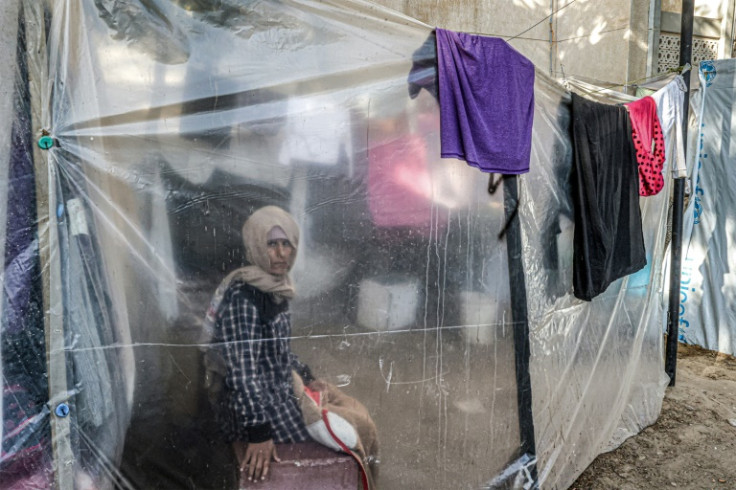'We Will Not Leave Gaza's Women And Girls Behind' - UNFPA Respond To Gaza's Severe Period Poverty
UNFPA responded to the situation of menstruating females in Gaza and spoke to International Business Times UK about what they are doing to tackle the period of poverty.

The United Nations Population Fund (UNFPA) is a subsidiary branch of the United Nations that sets out to protect the rights of women and girls worldwide.
Israel's limits on humanitarian and medical aid deliveries to Gaza have left women and girls witnessing the most severe cases of period poverty.
According to the UNFPA, more than 690,000 women and adolescent girls are menstruating in Gaza.
Affan Chowdhry, who works as a Communications Specialist for the UNFPA, told International Business Times UK that the females "have limited access to menstrual hygiene products in addition to inadequate water, hygiene, access to toilets and privacy".
The lack of sanitary products and spaces "puts them at risk of reproductive and urinary tract infections and protection-related risks", Chowdhry added.
In regard to the extreme levels of period poverty in Gaza, the Communications Specialist said: "The UNFPA is the United Nations sexual and reproductive health agency. Menstrual health is at the heart of our mandate."
Under the delivery restrictions, tampons, sanitary towels, contraceptive pills that could delay or halt periods and other menstrual products have been banned from entering the besieged enclave.
Riham Jafari, an ActionAid worker for Palestine, told reporters that the women and girls have been forced to use "parts of the tents" as a sanitary product replacement. Jafari has also seen menstruating females "using their extra clothes as pads".
"Women are having to resort to using scraps of tent materials or taking the birth control pill to stop their menstrual flow, or using diapers, if they have access to them," the UNFPA Communications Specialist agreed.
While the "UNFPA has distributed thousands of dignity and menstrual hygiene kits, we need to get much, much more in," Chowdhry told International Business Times UK.
As of mid-December, the UNFPA managed to deliver approximately 7,500 dignity kits and hygiene supplies to the menstruating females in Gaza.
So far this year, the UNFPA said that it had already "delivered 66 pallets of menstrual hygiene kits covering the needs of over 5,280 women for four months".
Each dignity kit contains a four-month supply of sanitary pads, new underwear, soap, prayer clothes and other basic essentials that support the right to menstrual health hygiene.
But still, "the assistance delivered in Gaza to date is nowhere near enough to meet the tremendous needs of women and girls," Chowdhry declared, urging international communities to facilitate an "effective aid operation".
Before October 7, around 500 humanitarian aid trucks were entering Gaza each day. As of January 2024, there are roughly 100 trucks carrying aid entering the Palestinian territory.
According to the UN, 60 per cent of the humanitarian deliveries have been passing through Karem Shalom for checks, a kibbutz in southern Israel that rests on the triple Gaza-Israel-Egypt border.
In the three catastrophic months of conflict, according to the Hamas-run Health Ministry, more than 26,000 Palestinians have been killed in Gaza.
The Health Ministry also reports that more than 62,000 people have been wounded by Israel's bombardment of the Strip and 85 per cent of Gaza's original 2.2 million population have been displaced.
Amongst the internally displaced persons, is an estimated 50,000 pregnant women.
"We are also helping pregnant women," Chowdhry told the International Business Times UK, explaining that between October 2023 and 12 January 2024, "we have delivered over 245 different kits to support 10,000 women giving birth".
Out of the staggering number of births that have taken place in Gaza over the past 16 weeks, 18,000, UNFPA equipment has supported more than 50 per cent of the births.
The Communications Specialist also told International Business Times UK that the female-focused organisation has also "provided cash assistance to 2,125 vulnerable women".
For the civilians trapped in the besieged Palestinian territory, every day is "a battle for survival", Chowdhry said.
Innocent people are forced to "search for food, clean water, medical care and shelter from the rain and cold," Chowdhry added, going on to recognise: "On top of that, women and girls cannot get their hands on menstrual health and hygiene items they need to avoid infection. Everyone should have that right to manage their menstruation with dignity – even in a conflict zone."
Concluding his statement, the Communications Specialist declared that the UNFPA "will not leave Gaza's women and girls behind", for "they must have access to the menstrual hygiene supplies they need – it's a matter of their health and dignity".
The UNFPA also told International Business Times UK that it is currently taking donations that will be put towards delivering more menstrual hygiene kits.
© Copyright IBTimes 2025. All rights reserved.






















